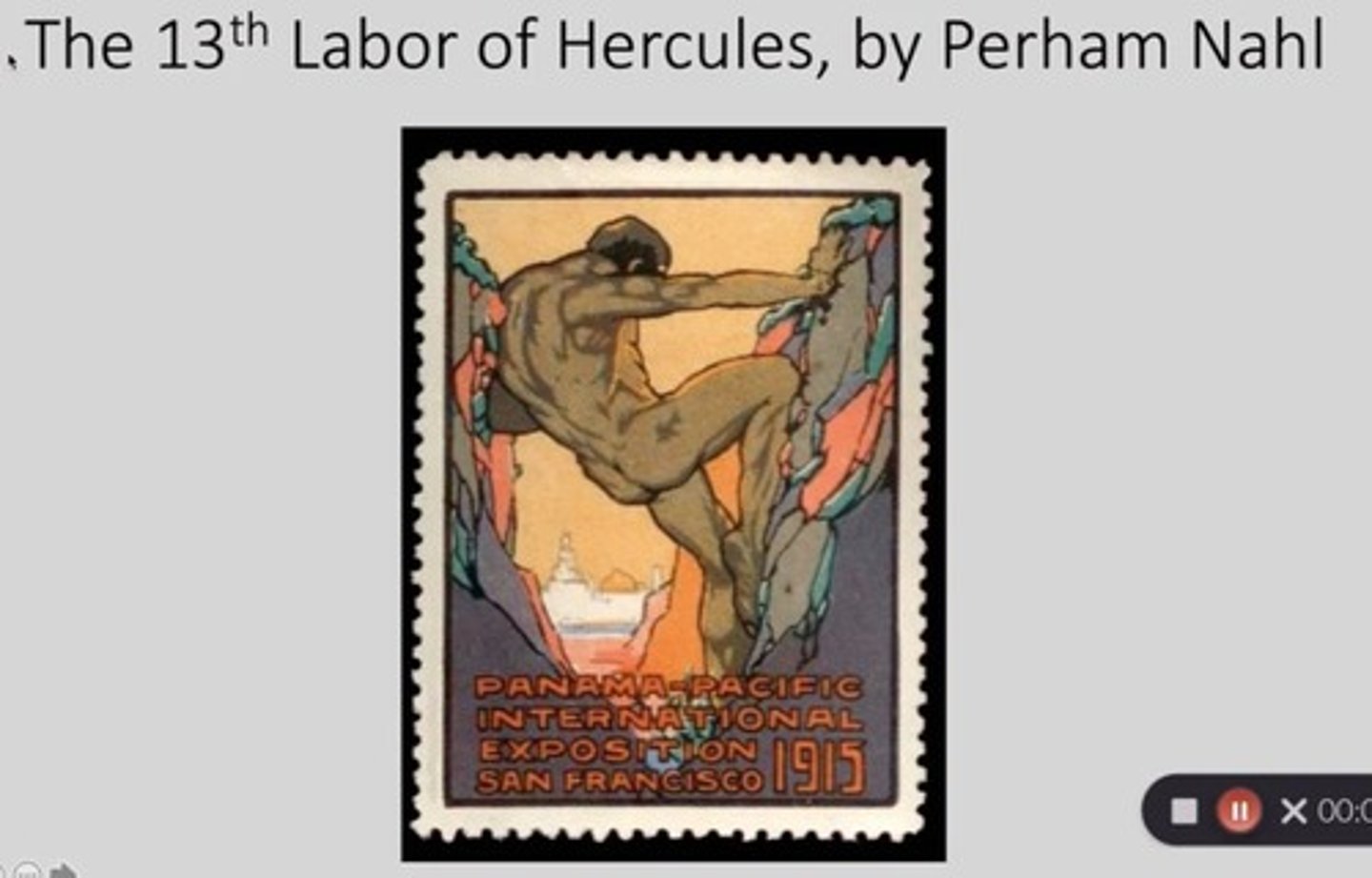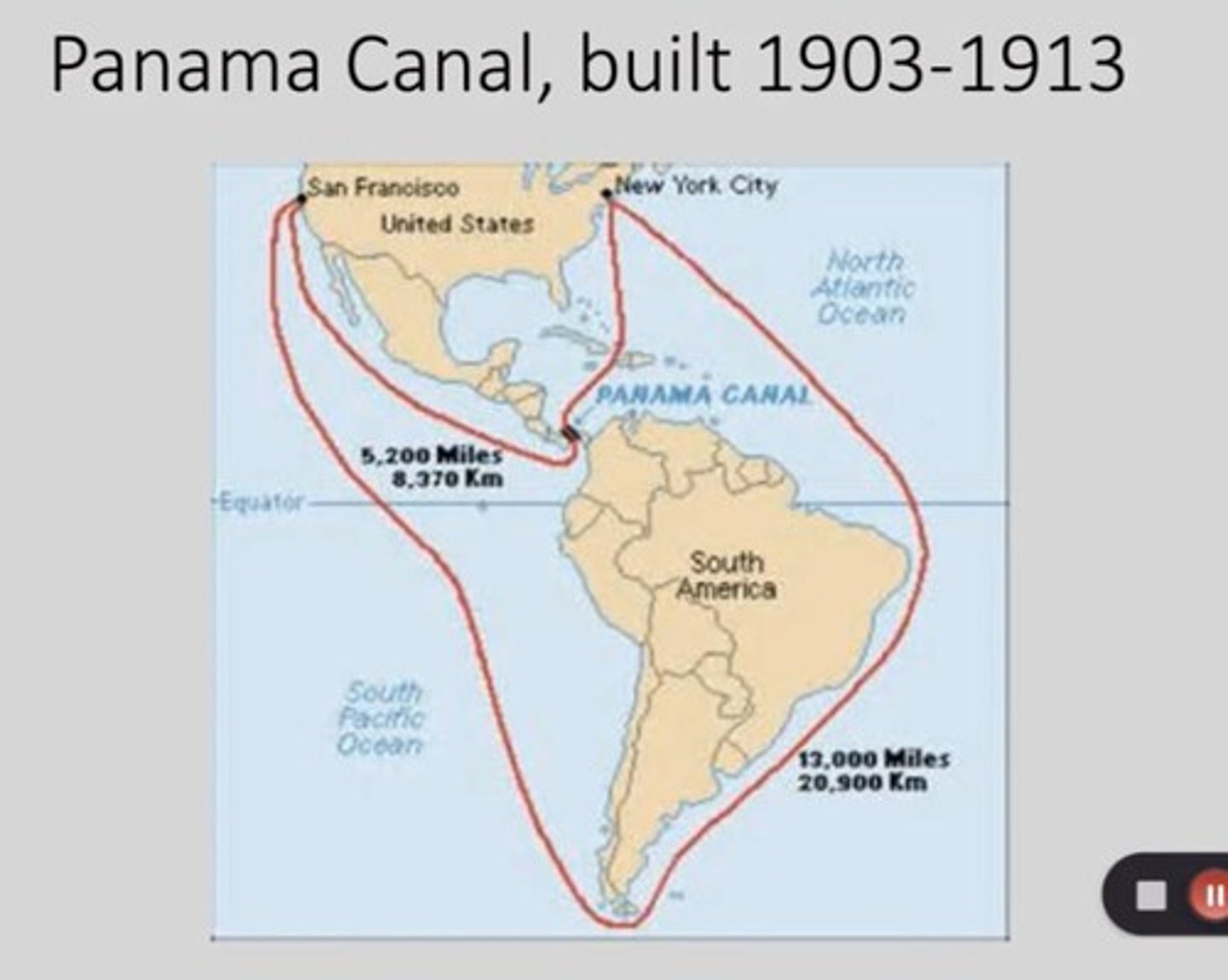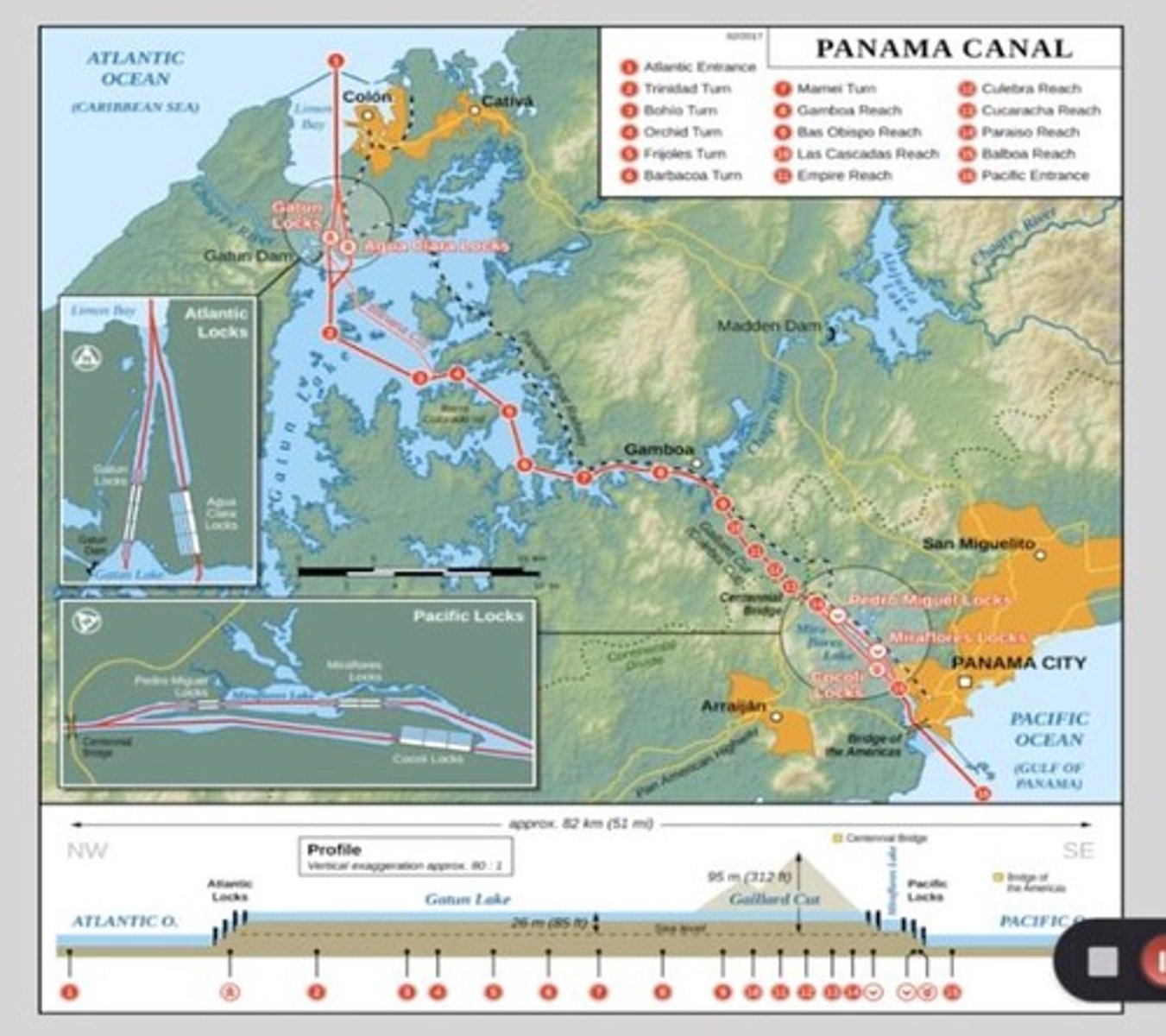The Panama Canal and American Imperialism
1/90
There's no tags or description
Looks like no tags are added yet.
Name | Mastery | Learn | Test | Matching | Spaced | Call with Kai |
|---|
No analytics yet
Send a link to your students to track their progress
91 Terms
What significant infrastructure project was completed by the United States in 1913?
The Panama Canal.
What was the name of the official image used for the 1915 Panama Pacific International Exposition?
The 13th Labor of Hercules.
Who created the poster for the 1915 World's Fair?
A California artist and art professor at UC Berkeley.

What mythological figure does the poster depict as completing a final labor?
Hercules.
What does Hercules symbolize in the context of the 1915 World's Fair?
American strength and imperialism.
What was the significance of the Panama Canal in terms of American infrastructure?
It was an amazing wonder of infrastructure and a symbol of American strength.
How many people attended the 1915 World's Fair?
18 million people from all over the world.
What major event was occurring around the time of the 1915 World's Fair?
World War I was beginning.
What was the Lincoln Highway, completed in 1950?
The first transcontinental automobile route from New York to San Francisco.
What was the impact of Henry Ford's introduction of the moving assembly line in 1915?
It revolutionized automobile production.
What was the context of U.S. involvement in World War I during the 1915 World's Fair?
The U.S. was providing aid to allies even though it had not yet entered the war.
What does the choice of Hercules as a representation at the World's Fair suggest about U.S. self-perception?
It suggests that the U.S. viewed itself as a powerful and capable nation at the height of modern imperialism.
What was the purpose of World Fairs like the one in 1915?
To showcase national achievements and innovations to an international audience.
What does the term 'imperial mindset' refer to in the context of the Canal and the World's Fair?
A perspective that emphasizes national strength, expansion, and dominance.
What year did the Panama Canal officially open?
1914
What was the cultural significance of the 1915 World's Fair in relation to American society?
It reflected significant social and cultural changes, including the women's suffrage movement.
What does the phrase 'the height of modern imperialism' imply about the U.S. during the early 20th century?
It implies that the U.S. was asserting itself as a dominant global power.
What were some of the tasks Hercules was known for in Greek mythology?
Slaying monsters, diverting rivers, and carrying the earth on his shoulders.
What was the broader argument made by Greg Grant in relation to the Canal and the World's Fair?
Both projects reflect the imperial mindset of the United States during that era.
How did the organizers of the World's Fair choose to represent the United States?
By depicting it as Hercules, a symbol of strength.
What was the significance of the 1915 World's Fair for the United States' image abroad?
It showcased the U.S. as an emerging world power.
What does the term 'World's Fair' refer to?
International exhibitions that showcase achievements of nations.
What was the role of the Panama Canal in global trade?
It created a shortcut between the Atlantic and Pacific Oceans, facilitating maritime trade.

What significant project did the United States undertake in Panama under President Teddy Roosevelt?
The construction of the Panama Canal.
What was the primary reason the U.S. supported the Panamanian Rebellion against Colombia?
To gain control over a narrow strip of land for building the canal.
How wide is the Isthmus of Panama at its narrowest point?
50 miles.
What was the main challenge faced by the French when they attempted to build the canal in the 1880s?
High costs and a high worker fatality rate due to the mountainous terrain and tropical climate.
What innovative solution did the United States implement to facilitate the passage of ships through the Panama Canal?
The installation of a series of locks to raise and lower ships.

How did the construction of the Panama Canal reduce travel distance for ships?
It cut the journey from New York City to San Francisco from 13,000 miles around Cape Horn to less than half that distance.
What were the working conditions like for the laborers who built the Panama Canal?
They faced dirty, dangerous, and backbreaking work, including shoveling dirt and rock.
What infrastructure did the United States build to support the construction of the Panama Canal?
Railroads across the Isthmus to transport supplies and workers.
What was the duration of the construction project for the Panama Canal?
It took 10 years to complete.
Who were the majority of the workers involved in the construction of the Panama Canal?
They were not Americans; the notes do not specify their nationalities.
What was the impact of the rainy season on the construction of the canal?
It caused landslides that interrupted progress and sometimes undid previous work.
What was the U.S. government's understanding regarding Panama's autonomy after the rebellion?
Panama was not entirely autonomous and accepted U.S. help with the understanding that the U.S. would want something in return.
What was the French approach to building the canal that ultimately failed?
They attempted to build the canal at sea level.
What was the historical context of Panama before 1903?
It was a state inside Colombia.
What was the role of President Teddy Roosevelt in the Panama Canal project?
He was a major proponent and facilitated the U.S. involvement in the Panamanian Rebellion.
What geographical feature complicated the construction of the Panama Canal?
The mountainous terrain of Panama.
What was the significance of the Panama Canal for international trade?
It provided a much shorter and more efficient route for ships traveling between the Atlantic and Pacific Oceans.
What did the successful construction of the Panama Canal symbolize for the United States?
It established the U.S. as a powerful nation capable of major engineering feats.
What was the primary motivation behind European interest in building a canal in Panama before the U.S. involvement?
To create a shortcut for maritime trade routes.
What was the outcome of the U.S. intervention in Panama's independence from Colombia?
The establishment of Panama as a new nation, albeit under U.S. influence.
What was the American version of the canal project compared to the French version?
It was significantly less labor-intensive due to the use of locks instead of a sea-level canal.
What did the construction of the canal require in terms of labor force?
Tens of thousands of workers were needed for the construction.
What types of jobs did relatively few Americans hold in Hama?
Mostly white collar jobs, such as engineers, construction workers, and clerical staff.
From where did the United States primarily recruit manual labor for canal construction?
The vast majority of workers came from the West Indies, including islands like Cuba, Jamaica, and the Bahamas.
What was the primary challenge in building the canal according to American engineers?
It was primarily a feat of human management rather than just engineering.
What technologies did American engineers use to build the canal?
Existing technologies such as steam shovels, backhoes, dynamite, and the concept of using locks.
How did American railroad companies' experience relate to canal construction?
Even railroad companies had never managed such a large and unfamiliar workforce before.
What system did Americans implement to manage the labor force in the canal zone?
A system of racial segregation.
What were the pay grades for workers in the canal zone?
Most manual laborers, often people of color, were on a silver roll, while white and skilled workers were on a gold roll.
What was the significance of the silver and gold roll system?
It determined not only pay but also where workers lived and the types of jobs they were eligible for.
What behaviors were American officials concerned about among workers in the canal zone?
Officials discouraged drinking, gambling, and engaging with prostitutes to maintain public health and worker productivity.
What methods did American officials use to keep workers entertained and contained?
They hosted wholesome dances, showed early film strips, and provided other forms of entertainment.
What parallels are drawn between canal workforce management and other examples in Greg Granton's book?
Both examples illustrate progressive ideas about social management and labor force control.
Who was a notable figure in the realm of scientific management of labor?
Henry Ford.
What was a major concern of American officials regarding workers' health?
They were worried about workers bringing diseases back into the canal zone.
What was the purpose of the separate entrances for silver and gold roll workers?
To reinforce the system of racial segregation and the differing value assigned to workers based on race.
What did the American officials aim to control about the workers' behavior?
They aimed to control their leisure activities and ensure they adhered to what officials considered civilized behavior.
How did the American officials view the workers' need for entertainment?
They believed that providing wholesome entertainment would prevent workers from engaging in behaviors deemed dangerous or uncivilized.
What was the context of the United States taking Cuba?
The U.S. took Cuba at the end of the Spanish-American War.
What was the overall goal of the American officials in managing the workforce?
To ensure a healthy and productive workforce capable of completing the canal project efficiently.
What did the American officials fear about the workers' social activities?
They feared that social activities could lead to health issues and disrupt work efficiency.
What concept did the American engineers rely on that was not new technology?
The concept of using locks to navigate multiple bodies of water.
What was the American officials' approach to managing the workers' weekends?
They tried to keep workers in the canal zone by providing entertainment and discouraging outings.
What does the term 'progressive ideas' refer to in the context of workforce management?
Ideas about social management that aimed to control and organize labor effectively.
What was the impact of the canal construction on the local workforce?
It created a complex dynamic of racial segregation and labor management that reflected broader societal issues.
What was Henry Ford's concept for the moving assembly line focused on?
Making workers perform as efficiently as possible to save time and money.
How did Ford's ideas influence industrial work during the Progressive Era?
They guided a lot of industrial work, emphasizing efficiency and management of people and industry.
What significant event occurred regarding the Panama Canal on January 1, 2000?
Panama regained control of the canal from the United States.
How did some Americans feel about the handover of the Panama Canal to Panama?
They felt it was embarrassing, believing that since the U.S. built it, it should belong to them.
What statement did an American journalist make on the day the U.S. handed over control of the Panama Canal?
The American century ended today.
What narrative was often told about the construction of the Panama Canal?
It was framed as an uncontested American accomplishment and a symbol of American imperial power.
What concept does the phrase 'the white man's burden' relate to in the context of the Panama Canal?
It reflects the justification for imperialism, suggesting that American actions were ultimately for the good of others.
When was the Panama Canal completed?
1914
What was Fordlandia?
A settlement built by Henry Ford in Brazil to establish a rubber plantation.
Why did Henry Ford establish Fordlandia?
He was concerned about British monopolization of the rubber trade, which was essential for his automobile manufacturing.
What parallels can be drawn between Henry Ford's actions and U.S. government actions in Panama?
Both reflect motivations of imperialism and control over resources, though Ford acted as a private citizen.
What was the main reason for Ford's concern regarding the rubber trade in the 1920s?
He wanted to avoid dependence on British suppliers for rubber needed in his automobiles.
How did Ford's project in Brazil ultimately fare?
It did not go well and did not last long.
What does the term 'privatized imperialism' refer to in the context of Fordlandia?
It refers to Ford's attempt to exert control and influence in a foreign land as a private manufacturer.
What is the significance of the phrase 'the ends justified the means' in the context of American imperialism?
It reflects the justification for actions taken during imperialism, suggesting that the outcomes were worth the methods used.
What role did scientific management play in the context of American industrialization?
It was seen as a merit of American ingenuity and a method to increase efficiency in industry.
What does the term 'American century' imply?
It refers to the period when the United States was seen as a dominant global power.
What is the importance of reading the assigned book by Ray Brandon?
It is crucial for understanding the material for quizzes, discussions, and exams.
How did Ford's actions in Brazil mirror U.S. government motivations?
Both sought to secure resources and exert control over foreign territories.
What was the American perception of the Panama Canal as a symbol?
It was viewed as a testament to American ingenuity and imperial power.
What was a common misconception about who built the Panama Canal?
Many Americans viewed it solely as an American accomplishment, overlooking the complexities of its construction.
What does the phrase 'the American century ended today' suggest about U.S. identity?
It implies a shift in perception of U.S. dominance and influence in the world.
What was the significance of the Progressive Era in relation to industrial work?
It was a time when efficiency and management practices became central to industrial development.